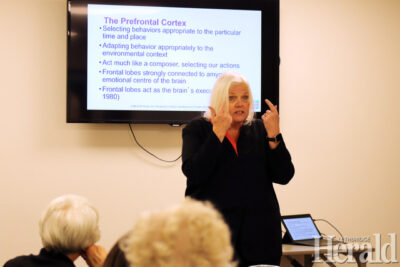Building Brains program expanding research to older adults
By Alejandra Pulido-Guzman - Lethbridge Herald on March 8, 2024.
 Herald photo by Alejandra Pulido-Guzman
Neuroscience professor Robbin Gibb talks to participants during a Building Brains Together pilot program session on Thursday at the Nord-Bridge Seniors Centre.
Herald photo by Alejandra Pulido-Guzman
Neuroscience professor Robbin Gibb talks to participants during a Building Brains Together pilot program session on Thursday at the Nord-Bridge Seniors Centre.LETHBRIDGE HERALDapulido@lethbridgeherald.com
Building Brains Together is expanding its research to include the effects of play on older adults and they offered a pilot program to a group of seniors in the community over the past four weeks.
Research associate with Building Brains out of the Neuroscience Department at the University of Lethbridge Vicki Hazelwood spoke to the Herald Thursday at Nord-Bridge Seniors Centre prior to the start of the last session of the four-week program and said it was very well received.
“Initially this research started with young children, but what we’ve been learning is that executive function which includes working memory, cognitive flexibility and behavioural inhibition, are skills that can be built and developed throughout the lifespan,” said Hazelwood.
 She said with older adults there is an opportunity to strengthen those skills, so they are developing a curriculum of activities and games that older adults can engage in to help them strengthen their executive functions.
 “What we’ve been doing here is about 15 minutes of teaching on the brain, stress and the brain, executive function and the brain. We’ve also talked about nutrition and exercise and things that really influence a strong healthy brain and prevent that decline that can sometimes happen in cognitive function at an older age,” said Hazelwood.
 She explained the pilot program offered one-hour weekly sessions that ran for the last four weeks, where 45 minutes were dedicated to play.
 “Play can sometimes be seen as a word to describe what children do, but what we are wanting the community to know is that play is essential for all ages, throughout the whole lifespan to maintain a healthy strong brain,” said Hazelwood.
Being able to participate in play during the pilot program was one highlight for Irene Carlson, one of the participants who told the Herald the program has been very beneficial for her in multiple ways.
“I cannot recommend it or praise it highly enough, it has been so interesting and so informative and positive for me as an older adult, and to do it in a way that allows you to become a kid again through play was fantastic,” said Carlson.
Carlson said she felt encouraged to make some changes to her lifestyle when she was told it was never too late to make small changes that will have a positive impact on her brain.
“It’s been very interesting, because of some of their nutritional information I’ve added Omega 3 and Omega 6 to my diet and it feels good to be able to make small changes,” said Carlson.
She said she always wants to take care of herself but does not always know how and therefore the program was very helpful for her.
“This has been giving me a lot of really good information about how to take care of the part of me that’s probably the most vulnerable at this age, my brain and my heart, and since my heart is in pretty good shape I said et’s look after my brain, said Carlson.
When it comes to the playing portion of the program Carlson recalled one particular game that was engaging and exciting, not only because of the benefits to the brain, but also because she wanted to stay in the game.
“We played a word game, the one to make a sentence. One person will say one word and the next one will add one more and then continue to add to it by each person,” said Carlson.
 She explained that each person on their turn had to repeat the sentence that has been created by the previous words.
 “By the time it gets around to the other side of the table you’re repeating the entire story and if you miss, you’re out until the next round, but if you can say the whole thing correctly then it goes on to the next person,” said Carlson.
 She said it was a lot of fun and something that not many adults engage in which made it more interesting and somewhat challenging.
Hazelwood said thy are focusing on play that allows participants to interact with others for this programming based on the benefits shown through their research.
“The type of play that we are seeing through our research that shifts and strengthens executive function skills, is the type of play that involves social interaction while engaging with another person in playful activities,” said Hazelwood.
While this was a pilot program, Hazelwood said research needs to continue and in April they will be running a program similar to the one they just finished, but where they will be asking participants to actually become part of their research.
“Participants who choose to sign up for our research study will play a short game on an iPad that measures executive function, they’ll engage in our program for four weeks and then we’ll do a post-assessment to see if the results show a shift in executive function,” said Hazelwood.
24-23




